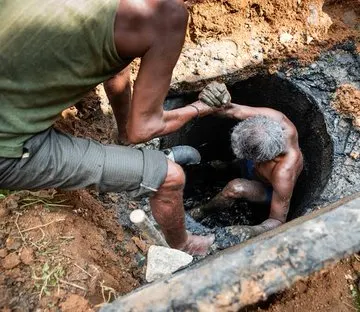– Abdul Bari Masoud
A one-day workshop titled “Underground Voices: Empowering the Backbone of Our Cities” was held on Saturday at the Constitution Club of India. It focused on the dangerous, invisible world of sewer and septic tank workers in India.
The workshop saw participation from over 100 people, including sanitation workers, union leaders, legal experts, journalists, academics, and members of civil society. It was organised by Dalit Adivasi Shakti Adhikar Manch (DASAM) in collaboration with various unions and grassroots organisations. The event called for urgent policy reform and accountability.
During the workshop, DASAM released its latest fact-finding report. The report documented 11 worker deaths between May 2024 and May 2025 in the Delhi-NCR region. These deaths are often wrongly reported or dismissed as accidents.
“These deaths are not accidents but results of a caste-based exploitative system,” said Mohsina Akhter, National Coordinator of DASAM. “Manual scavenging continues despite court rulings and legal bans, with no serious consequences.”
Speakers said that over 90% of sanitation workers belong to Dalit communities. Most are hired through informal contracts that deny them protective gear, proper wages, or legal protection.
Several sanitation workers shared emotional stories of unsafe working conditions, lack of safety gear, delayed payments, and harassment.
Hemlata Kansotia, National Convenor of NCDRSAW, highlighted long-term health effects from toxic exposure. “Deaths are seen, but the slow damage to health remains ignored,” she said.
Dr. Sunil Ram, a social activist, criticised the way authorities handle these cases. “Compensation is discussed only after deaths. Prevention is never a focus. These workers clean our cities, yet are treated like they don’t matter,” he said.
Dr. Seema Mathur, an academic, said that caste, gender, and trauma are often ignored. “Women sanitation workers face extra layers of discrimination,” she said.
A panel discussion followed with key voices including Virendra Gaur (CITU Delhi-NCR), Ved Prakash (DJB Sewer Dept. Mazdoor Sangathan), Dharmendra Bhati (Municipal Workers Lal Jhanda Union), Dr. Sunilam (Activist), Vijay Kumar Balguher (Akhil Bhartiya Shramik Sangh), Azad Singh Dedha (All DJB Employees Welfare Association), and Varsha Prakash (Journalist). They all agreed that small, temporary changes won’t help. What is needed is formal employment, strict legal action, and structural reforms.
The workshop ended with the adoption of a Charter of Demands. It included: FIRs under the 2013 Manual Scavenging Act, SC/ST Act, and Bharatiya Nyaya Sanhita; ₹30 lakh compensation to families of deceased workers; judicial inquiries into every death; permanent jobs for all sanitation workers; a nationwide sanitation audit in both urban and rural areas; and mandatory safety gear and training for workers.
Organisers said this workshop is just the beginning of a national campaign. Their goal is to secure dignity, justice, and safety for the workers who silently keep India’s cities running.
“It’s time to bring these underground voices above ground—and into the heart of policy-making,” said one participant.




